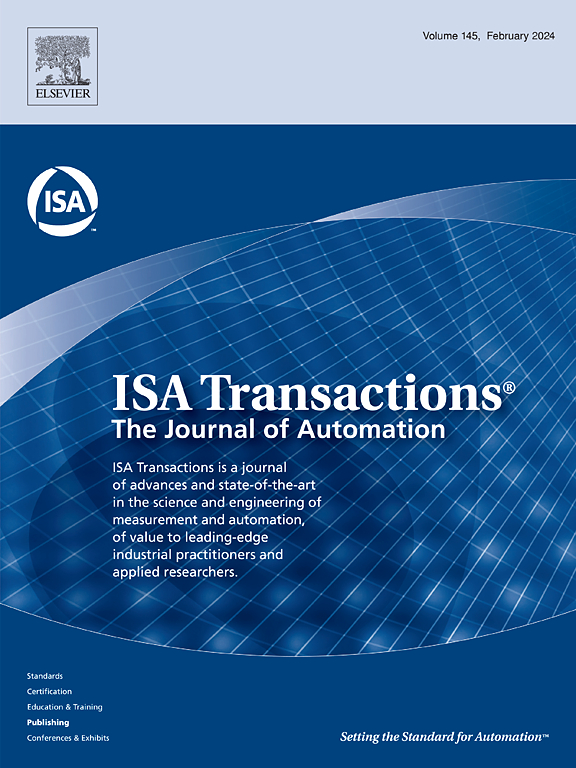Additive-state-decomposition-based cascaded linear ADRC for nonlinear uncertain systems with application to PMSM speed regulation
IF 6.5
2区 计算机科学
Q1 AUTOMATION & CONTROL SYSTEMS
引用次数: 0
Abstract
This paper investigates the tracking control problem for a class of nonlinear systems subject to time-varying total disturbance and proposes a cascaded linear active disturbance rejection control (CLADRC) approach based on additive state decomposition (ASD). By employing the ASD technique, the original system is equivalently decomposed into a nominal primary system and an uncertain secondary system. The primary system eliminates the estimated total disturbance to achieve precise reference tracking, while the secondary system suppresses the residual disturbance. Both subsystems are governed by state feedback controllers incorporating disturbance estimation and compensation. Compared to the standard linear active disturbance rejection control strategy, the proposed method fully decouples the tracking and robust components of the state feedback controller, enabling independent parameter tuning. Furthermore, by introducing a linear extended state observer for the secondary system, a secondary estimation of the residual disturbance is performed, thereby enhancing the robustness of the overall system. A criterion based on Lyapunov stability theory is provided to ensure that the closed-loop systems remain uniformly ultimately bounded. Finally, simulation and experimental results on permanent magnet synchronous motor (PMSM) speed regulation validate the effectiveness and superiority of the proposed approach.
非线性不确定系统的加性状态分解级联线性自抗扰控制及其在永磁同步电机调速中的应用。
研究了一类时变总扰动非线性系统的跟踪控制问题,提出了一种基于加性状态分解(ASD)的级联线性自抗扰控制方法。采用ASD技术,将原系统等效分解为标称一次系统和不确定二次系统。主系统消除估计的总干扰以实现精确的参考跟踪,而副系统抑制残余干扰。两个子系统都由状态反馈控制器控制,该控制器结合了干扰估计和补偿。与标准的线性自抗扰控制策略相比,该方法完全解耦了状态反馈控制器的跟踪和鲁棒组件,实现了参数的独立整定。此外,通过引入二次系统的线性扩展状态观测器,对残余扰动进行二次估计,从而增强了整个系统的鲁棒性。基于李雅普诺夫稳定性理论,给出了闭环系统最终保持一致有界的判据。最后,通过对永磁同步电机(PMSM)调速的仿真和实验验证了该方法的有效性和优越性。
本文章由计算机程序翻译,如有差异,请以英文原文为准。
求助全文
约1分钟内获得全文
求助全文
来源期刊

ISA transactions
工程技术-工程:综合
CiteScore
11.70
自引率
12.30%
发文量
824
审稿时长
4.4 months
期刊介绍:
ISA Transactions serves as a platform for showcasing advancements in measurement and automation, catering to both industrial practitioners and applied researchers. It covers a wide array of topics within measurement, including sensors, signal processing, data analysis, and fault detection, supported by techniques such as artificial intelligence and communication systems. Automation topics encompass control strategies, modelling, system reliability, and maintenance, alongside optimization and human-machine interaction. The journal targets research and development professionals in control systems, process instrumentation, and automation from academia and industry.
 求助内容:
求助内容: 应助结果提醒方式:
应助结果提醒方式:


